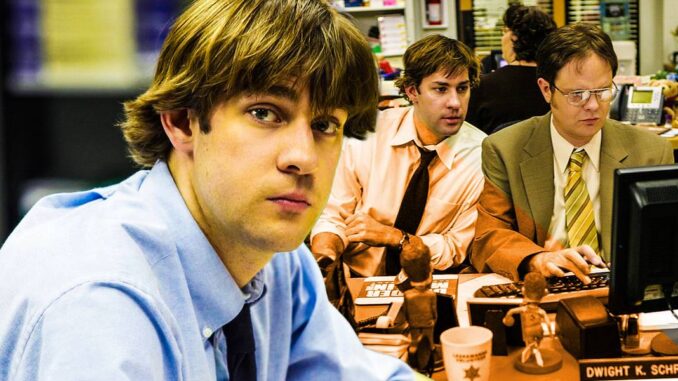
The office air in Scranton, Pennsylvania, hung heavy with the usual perfume of stale coffee, photocopy toner, and the faint, unsettling scent of beet farming success wafting from a particular corner. Jim Halpert, leaning back in his chair, feet propped on his desk, considered the challenge. He’d achieved legendary status within the Dunder Mifflin Scranton branch for his elaborate, often brilliant, and occasionally infuriating pranks on Dwight K. Schrute. From the jello-encased stapler to the completely fabricated "Asian Jim," his resume was a testament to his creative genius.
But there was a new, unspoken goal. A holy grail of office tomfoolery. To execute a prank so exquisitely subtle, so whisper-thin in its execution, that even Dwight K. Schrute, Assistant to the Regional Manager, self-proclaimed martial arts master, and perpetual paranoid guardian of the paper supply, would miss it entirely.
Dwight, a man who could detect a missing paperclip at twenty paces and theorize about a conspiracy involving the fluctuating humidity, was an impossible target for true subtlety. His mind was a steel trap, albeit one often filled with obscure farm implements and the convoluted rules of Battlestar Galactica. He noticed everything. Or so he thought.
Jim spent weeks in quiet observation. He considered altering the office temperature by a fraction of a degree each day, but Dwight would simply blame the AC unit and write a scathing memo. He thought about ever-so-slightly shifting the angle of Dwight’s desk, but Dwight had protractor-level spatial awareness. The prank had to be existential, a ghost in the machine of Dwight's perception, something he interacted with daily but never truly analyzed.
Then, it hit him, like a perfectly thrown paper airplane. It was about the paper.
Dwight’s relationship with paper was almost spiritual. He fetishized its crispness, its weight, its blinding white purity. He could tell the difference between 20 lb bond and 24 lb bond by feel alone. He believed in the inherent superiority of Dunder Mifflin brand paper, often citing its ideal GSM (grams per square meter) as the pinnacle of office utility.
The prank began with surgical precision. Jim acquired several reams of varying, ever-so-slightly lighter paper stock. Not cheap, flimsy stuff, but paper that, to the untrained eye, looked identical to Dunder Mifflin’s premium offering. The difference in weight, however, was infinitesimal, a mere gram or two per ream.
Each morning, before Dwight arrived, Jim would perform his delicate ritual. He would take one freshly opened ream of Dwight’s beloved Dunder Mifflin 20 lb bond and replace it with a ream of the slightly lighter stock. The original ream would be stealthily integrated into the general office supply. Dwight, who went through paper with the ferocity of a beaver building a dam, would tear through a ream, or even two, a day.
The change wasn't sudden. It was a creeping, almost imperceptible erosion of the paper's essence. On Monday, Dwight might notice nothing. On Tuesday, a vague, unidentifiable sensation might flicker across his consciousness as he picked up a fresh stack of reports. Did this feel… lighter? He'd dismiss it, chalking it up to a trick of the light, or perhaps his own fluctuating hand strength. He was, after all, a highly trained physical specimen.
A week passed. The cumulative effect, though still minor, was growing. Dwight, hunched over his desk, filling out expense reports or drafting stern reprimands for tardy co-workers, would occasionally pause. He’d tap a stack of paper, run his thumb along its edge. "This new batch," he’d mutter to himself, "feels… less substantial. Perhaps a batch defect?" He’d then dismiss the thought. Dunder Mifflin paper, he knew, was flawless. It had to be. To question its integrity was to question the very fabric of his reality.
Jim watched, a silent, internal chuckle rumbling in his chest. He saw Dwight absentmindedly weigh a stack of paper in his hands, frown, then quickly move on. He saw him tap a ream against his desk, as if trying to coax back its lost density. Dwight would occasionally complain about the "flimsiness" of a new shipment, but he’d blame the delivery driver, or the humidity, or a corporate conspiracy, never the paper itself. The idea that his beloved paper had been diminished was beyond his capacity for belief. It was too personal, too fundamental.
Months passed. Dwight’s office was subtly transformed. His filing cabinets now contained reams of reports printed on paper that, collectively, weighed significantly less than they should. The subtle drag of a stapler through a thick document was now a little too effortless. The crisp snap of a page turning was just a fraction less satisfying. The faint, almost subconscious expectation of a certain tactile resistance, built over decades of paper handling, was being subtly undermined.
The beauty of the prank was its permanence and its absolute un-provability. There was no "aha!" moment for Jim to reveal, no grand unveiling. If he ever told Dwight, "I replaced all your paper with slightly lighter stock," Dwight would simply demand proof. And Jim couldn't provide it, not definitively. The old paper was gone, absorbed into the general office supply. The difference was too minute, too gradual to pinpoint retroactively.
The prank existed solely in Jim’s quiet, private triumph. It was a masterpiece of imperceptibility, a ghost in Dwight’s meticulously ordered world. Dwight continued his duties, unwavering, yet a tiny, unidentifiable itch persisted in the back of his mind, a fleeting thought that something about the feel of his work had subtly changed. He just couldn't put his finger on it.
And that, Jim knew, was the greatest prank of all. Not the one that caused chaos, but the one that left no trace, save for the phantom weight of a truly masterful, truly subtle, and utterly unacknowledged victory. Even Dwight, with all his paranoia and meticulous observation, had missed it. It was the prank that proved true genius lay not in the punchline, but in the exquisite, unshared anticipation.